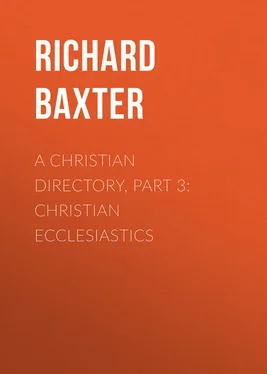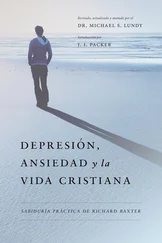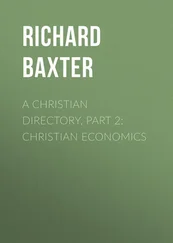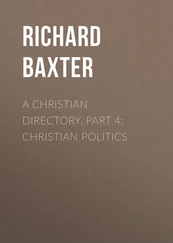Richard Baxter - A Christian Directory, Part 3 - Christian Ecclesiastics
Здесь есть возможность читать онлайн «Richard Baxter - A Christian Directory, Part 3 - Christian Ecclesiastics» — ознакомительный отрывок электронной книги совершенно бесплатно, а после прочтения отрывка купить полную версию. В некоторых случаях можно слушать аудио, скачать через торрент в формате fb2 и присутствует краткое содержание. Жанр: foreign_antique, foreign_prose, на английском языке. Описание произведения, (предисловие) а так же отзывы посетителей доступны на портале библиотеки ЛибКат.
- Название:A Christian Directory, Part 3: Christian Ecclesiastics
- Автор:
- Жанр:
- Год:неизвестен
- ISBN:нет данных
- Рейтинг книги:3 / 5. Голосов: 1
-
Избранное:Добавить в избранное
- Отзывы:
-
Ваша оценка:
- 60
- 1
- 2
- 3
- 4
- 5
A Christian Directory, Part 3: Christian Ecclesiastics: краткое содержание, описание и аннотация
Предлагаем к чтению аннотацию, описание, краткое содержание или предисловие (зависит от того, что написал сам автор книги «A Christian Directory, Part 3: Christian Ecclesiastics»). Если вы не нашли необходимую информацию о книге — напишите в комментариях, мы постараемся отыскать её.
A Christian Directory, Part 3: Christian Ecclesiastics — читать онлайн ознакомительный отрывок
Ниже представлен текст книги, разбитый по страницам. Система сохранения места последней прочитанной страницы, позволяет с удобством читать онлайн бесплатно книгу «A Christian Directory, Part 3: Christian Ecclesiastics», без необходимости каждый раз заново искать на чём Вы остановились. Поставьте закладку, и сможете в любой момент перейти на страницу, на которой закончили чтение.
Интервал:
Закладка:
Yet here are very great difficulties in this case, which causeth difference among the learnedest, pious casuists. 1. If a governor have beforehand made a law for that which I vow against, it is supposed by many that my vow is not to be kept, (the thing being not against the law of God,) because the first obligation holdeth. 2. Yet some think that magistrates' penal laws binding but aut ad obedientiam aut ad pœnam , to obedience or punishment, I am therefore obliged in indifferent things to bear his penalty, and to keep my vow. 76 76 Sanderson, p. 72, 73. Dico ordinarie quia fortassis possunt dari casus in quibus juramentum quod videtur alicui legi communitatis aut vocationis adversari, etsi non debuerit suscipi, susceptum tamen potest obligare: ut e. g. in lege pœnali disjunctiva. See the instances which he addeth. Joseph took an oath of the Israelites, to carry his bones out of Egypt, Gen. l. 25. What if Pharaoh forbid them? Are they acquit? The spies swore to Rahab, Josh. ii. 12, 18. Had they been quit if the rulers had acquit them?
3. But if I first make an absolute vow in a thing indifferent, (as to drink no wine, or to wear no silks, &c.) and the magistrate afterwards command it me, some think I am bound to keep my vow; because though I must obey the magistrate in all things lawful, yet my vow hath made this particular thing to be to me unlawful, before the magistrate made it a duty. 4. Though others think that even in this case the general obligation to obey my superiors preventeth my obliging myself to any particular which they may forbid in case I had not vowed it, or against any particular which they may command. 5. Others distinguish of things lawful or indifferent, and say that some of them are such as become accidentally so useful or needful to the common good, the end of government, that it is fit the magistrate make a law for it, and the breaking of that law will be so hurtful, that my vow cannot bind me to it, as being now no indifferent thing; but other indifferent things they say belong not to the magistrate to determine of (as what I shall eat or drink, whether I shall marry or not, what trade I shall be of, how each artificer, tradesman, or professor of arts and sciences shall do the business of his profession, &c.) And here the magistrate they think cannot bind them against their vows, because their power of themselves in such private cases is greater than his power over them in those cases. All these I leave as so many questions unfit for me to resolve in the midst of the contentions of the learned. The great reasons that move on both sides you may easily discern. 1. Those that think an oath in lawful things, obligeth not contrary to the magistrate's antecedent or subsequent command, are moved by this reason, That else subjects and children might by their vows exempt themselves from obedience, and null God's command of obeying our superiors. 2. Those that think a vow is obligatory against a magistrate's command, are moved by this reason, Because else, say they, a magistrate may at his pleasure dispense with all vows, except in things commanded before by God: for he may come after and cross our vows by his commands, which, against the pope's pretensions, protestants have denied to be in the power of any mortal man. And God, say they, hath the first right, which none can take away. I must not be forward in determining where rulers are concerned; only to those that may and must determine it, I add these further materials to be considered of.
1. It is most necessary to the decision of this case, to understand how far the inferior that voweth was sui juris , and had the power of himself when he made the vow, as to the making of it, and how far he is sui juris as to the act which he hath vowed; and to that end to know, in a case where there is some power over his act, both in his superior and in himself, whether his own power, or his superior's, as to that act, be the greater.
2. It is therefore needful to distinguish much between those acts that are of private use and signification only, and those that (antecedently to the ruler's command) are of public use and nature, or such as the ruler is as much concerned in as the inferior.
3. It is needful to understand the true intent and sense of the command of our superior; whether it be really his intent to bind inferiors to break their vows, or whether they intend only to bind those that are not so entangled and pre-engaged by a vow, with a tacit exception of those that are. 77 77 Read of this at large, Amesii Cas. Cons. l. v. c. 5. qu. 4.
And what is most just must be presumed, unless the contrary be plain.
4. It must be discerned whether the commands of superiors intend any further penalty than that which is affixed in their laws: as in our penal laws about using bows and arrows, and about fishing, hunting, &c.; whether it be intended that the offender be guilty of damnation, or only that the threatened temporal penalty do satisfy the law; and whether God bind us to any further penalty than the superior intendeth.
5. The end of the laws of men must be distinguished from the words; and a great difference must be put between those forbidden acts that do no further harm than barely to cross the letter of the law, or will of a superior, and those that cross the just end of the command or law; and that either more or less, as it is more or less hurtful to others, or against the common good: for then the matter will become sinful in itself.
6. Whether perjury, or the unwilling violation of human laws, be the greater sin, and which in a doubtful case should be most feared and avoided, it is easy to discern.
Rule XXVII. A vow may be consequently made null or void, 1. By cessation of the matter, or any thing essential to it, (of which before,) or by a dispensation or dissolution of it by God to whom we are obliged. No doubt it is in God's power to disoblige a man from his vow; but how he ever doth such a thing is all the doubt: extraordinary revelations being ceased, there is this way yet ordinary, viz. by bringing the matter which I vowed to do, under some prohibition of a general law, by the changes of his providence.
Rule XXVIII. As to the power of man to dispense with oaths and vows, there is a great and most remarkable difference between those oaths and vows where man is the only party that we are primarily bound to, and God is only appealed to as witness or judge, as to the keeping of my word to man; and those oaths or vows where God is also made (either only or conjunct with man) the party to whom I primarily oblige myself. For in the first case man can dispense with my oath or vow, by remitting his own right, and releasing me from my promise; but in the second case no created power can do it. As e. g. if I promise to pay a man a sum of money, or to do him service, and swear that I will perform it faithfully; if upon some after bargain or consideration he release me of that promise, God releaseth me also, as the witnesses and judge have nothing against a man, whom the creditor hath discharged. But if I swear or vow that I will amend my life, or reform my family of some great abuse, or that I will give so much to the poor, or that I will give up myself to the work of the gospel, or that I will never marry, or never drink wine, or never consent to popery or error, &c.; no man can dispense with my vow, nor directly disoblige me in any such case; because no man can give away God's right: all that man can do in any such case is, to become an occasion of God's disobliging me: if he can so change the case, or my condition, as to bring me under some law of God, which commandeth me the contrary to my vow, then God disobligeth me, or maketh it unlawful to keep that vow. And here because a vow is commonly taken for such a promise to God, in which we directly bind ourselves to him, therefore we say, that a vow (thus strictly taken) cannot be dispensed with by man; though in the sense aforesaid, an oath sometimes may.
Читать дальшеИнтервал:
Закладка:
Похожие книги на «A Christian Directory, Part 3: Christian Ecclesiastics»
Представляем Вашему вниманию похожие книги на «A Christian Directory, Part 3: Christian Ecclesiastics» списком для выбора. Мы отобрали схожую по названию и смыслу литературу в надежде предоставить читателям больше вариантов отыскать новые, интересные, ещё непрочитанные произведения.
Обсуждение, отзывы о книге «A Christian Directory, Part 3: Christian Ecclesiastics» и просто собственные мнения читателей. Оставьте ваши комментарии, напишите, что Вы думаете о произведении, его смысле или главных героях. Укажите что конкретно понравилось, а что нет, и почему Вы так считаете.












